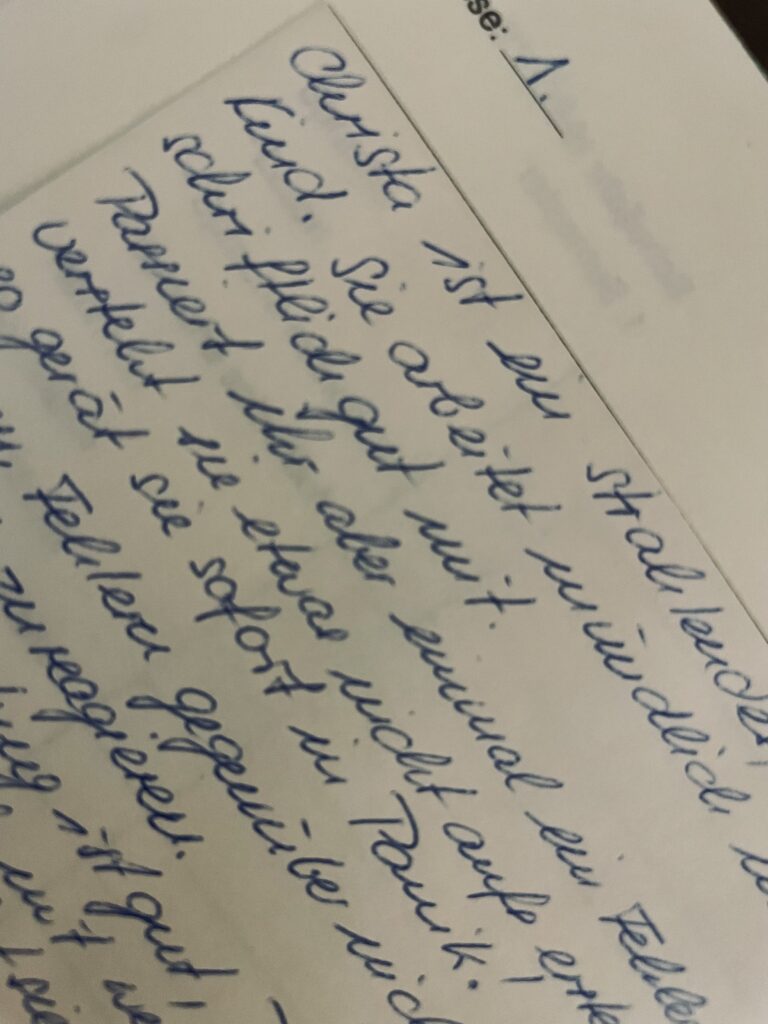Rethink how we handle failure in learning
A positive culture of error: What a phrase! But is making mistakes today really less embarrassing than it used to be? People still don’t like being wrong – especially in school. (1) These words sum up how failure is often treated in education – as the unspeakable “F-word.” Despite all the talk about learning from mistakes, the fear of failure remains deep in many students and classrooms. It’s time to rethink how we handle failure in learning and turn this dreaded F-word into a stepping stone for growth.
Let’s explore this further and dive into why failure is still a major roadblock in education – and how we can change that.

My first report card: “Christa is a bright, sweet child. She excels both verbally and in writing. However, if she makes a mistake or doesn’t understand something right away, she immediately panics! She needs to learn not to react so strongly to mistakes.”
The Fear of Failure: Why Mistakes Still Hold Learners Back
A Personal Reflection: My Experience with Mistakes in School
I remember the sting of red pen marks on my homework and the sinking feeling of being wrong. I was so afraid of making mistakes that even a small error could send me into a panic. (My first report card actually warned “she panics… She needs to learn not to react so strongly to mistakes” – ouch.) (2)
Wrong remains Wrong
Decades later, I’ve realized my early anxiety wasn’t unique. While developing enduri, I wrote about this fear in an article called “Wrong remains Wrong” in Bildung Schweiz and found that it’s still alive and well in classrooms today. Teachers and experts confirmed that the fear of making mistakes still prevents many learners from taking on challenges (3). If you’ve ever held back a question or an answer because you weren’t 100% sure, you know the feeling. Being wrong can feel embarrassing in a classroom (4), so students learn it’s safer to stay quiet or stick to what they know. Better to get a decent grade without risk than try something daring and “fail.”
Insights on Learning & Self-Determination
The Psychological Impact of Fear-Based Learning
Sociologist Martin Hafen suggested that schools should measure success by how much students learn, not by how few errors they make. “What should be counted are insights, not mistakes,” he argues (5). That means giving students the time and trust to learn from mistakes, rather than just marking them wrong and moving on Treating failure as taboo can backfire, because fear actually undermines learning.
The “F-Word” in Education: Why Failure is Misunderstood
Neuroscience shows that making mistakes spurs our brains to learn (6), but intense fear of mistakes triggers anxiety that can shut down the brain’s problem-solving centers (7). Studies have found that students who fear failure tend to have higher anxiety and lower performance (8), and they often avoid challenges that would help them grow (9). By misunderstanding failure – seeing it as something shameful instead of useful – we end up with learners who are less resilient and less willing to push themselves.
Creating a Safe Space for Exploration and Growth
The benefits of enduri’s adaptive, strength-based learning approaches
At enduri, we’ve put these ideas into practice by making our platform a safe space for exploration. Students using enduri can try different strategies and fail without fear of judgment. Using a stratgey that doesn’t fit at all – isn’t a dead end. It’s just a step toward finding a better solution, with helpful feedback to guide them. The focus is on progress and improvement, not punishment. We even avoid using the word “failure” on the platform. Instead of an “F”, we highlight progress – “Progress counts!”is our motto (10). Once students realize no one is tallying their errors, they become more confident and curious. That fear of failure fades, replaced by a focus on trying new ways to learn.
How enduri supports neurodiverse students
enduri is also designed with neurodiverse learners in mind, many of whom have been traumatized by past failuresand by a system that wasn’t built for them. Our platform allows students to learn at their own pace, in their own way, using strategies tailored to their individual needs. With enduri, learning is not a one-size-fits-all journey, but a personalized experience that embraces strengths and encourages risk-taking.
Conclusion: Embracing Mistakes as a Path to Learning Success
Helping Teachers Foster a Positive Mistake Culture
In sum failure in education isn’t a dirty word – it’s a stepping stone. By making our schools places where it’s safe to experiment, mess up, and try again, we turn failures into opportunities to grow. When we embrace mistakes as lessons rather than verdicts, we empower students to become confident, lifelong learners. At enduri, we believe that failure is not the end—it’s part of the process. Our platform helps students explore different learning strategies, embrace trial and error, and gain confidence in their own learning journey. For teachers, enduri provides practical tools to foster a classroom culture that encourages experimentation and continuous learning.
Changing the Culture Around Mistakes in Learning
enduri is process-oriented, not result-driven. There’s no final grade that defines a learner’s ability—only continuous growth. Every mistake is just a step toward mastery, another insight gained, another strategy tested. By reframing failure as an expected and necessary part of learning, we give students the courage to take risks, explore different methods, and ultimately grow into independent learners. Ready for it? Start now: www.enduri.org
Sources:
- Wüthrich, C. (2025). “Wrong remains wrong.” Bildung Schweiz.
- Hechinger Report. (2023). “PROOF POINTS: Nearly 6 out of 10 middle and high school grades are inaccurate.” The Hechinger Report.
- Harvard Graduate School of Education. (2023). “The Problem with Grading.” Ed Magazine.
- Hechinger Report. (2021). “OPINION: A leading researcher offers ideas for evaluating student learning beyond letter and number grades.” The Hechinger Report.
- Hechinger Report. (2022). “PROOF POINTS: New evidence of high school grade inflation.” The Hechinger Report.
- Hechinger Report. (2024). “OPINION: Instead of panicking over test scores, let’s rethink how we measure learning and student success.” The Hechinger Report.
- Hechinger Report. (2023). “PROOF POINTS: It’s easier and easier to get an A in math.” The Hechinger Report.
- Hechinger Report. (2024). “Kids in Larger Bodies Do Worse in School. One Reason May Be Teacher Bias.” Teen Vogue.
- Hechinger Report. (2024). “Momentum builds for helping students adapt to college by nixing freshman grades.” The Hechinger Report.
- enduri. (2025). “Learning & the ‘F-Word’.” enduri.org.

